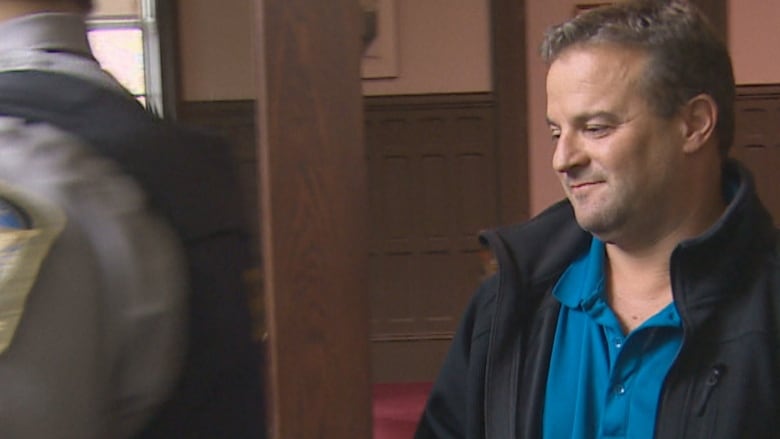Should a convicted fraudster facing more financial crime charges sell used cars?
Car dealers group calls for criminal record checks for salespeople, greater accountability

A former solar panel salesman who was recently sentenced for bilking a man out of tens of thousands of dollars is now selling cars in the Halifax area despite having two more fraud cases before the courts, CBC News has learned.
That's raising questions about how a person's right to earn a living is weighed against the protection of the public from a convicted criminal.
Barry Pincock, 52, has been working as a salesperson at Capital Auto Sales and Repairs on Cobequid Road in Lower Sackville, handling personal and financial information of customers.
One Kijiji ad says Pincock is able to provide "financing options," while another says "all forms of income taken."

In November, Pincock was sentenced for defrauding Dave Fullerton of $34,524 for solar panels never received.
Pincock was ordered to repay Fullerton and pay two $100 fines. He was also handed a 90-day jail sentence to be served on weekends. An inmate who checks in on Friday night and leaves Monday morning is credited four days.
Pincock is currently awaiting a judge's decision in June on two fraud charges involving a solar panel customer in Dartmouth, and has another fraud case coming up in Pictou County later this month.
'God knows what's going to happen'
For the Brookside, N.S., man who was "ripped off" to the tune of $34,524, news of Pincock's employment has left him conflicted.
Fullerton said he hopes Pincock lands a good job such as a sales position in order to repay him, though he noted the chances of being reimbursed are "slim to none."
- Solar panel business owner changes pleas to guilty in fraud case
- Werth Solar owner Barry Pincock arrested for 5 fraud charges
- Werth Solar leaves customers in the dark when panels not installed
Fullerton, who lost his retirement savings to Pincock, said solar panels and vehicles are big-ticket items that many people take out loans to purchase.
"God knows what's going to happen," said Fullerton. "I would not recommend anybody buying a car from Barry."
Call for criminal record checks for salespeople
The case raises "a level of concern" for the Nova Scotia Automobile Dealers Association, which has consulted with the province on new regulations to accompany the new Traffic Safety Act.
The association is recommending the province craft regulations that require car salespeople to be licensed and undergo criminal record checks. It also wants dealerships held accountable for the actions of their salespeople.
John Sutherland, the group's executive vice-president, said "these types of measures will protect the public and will enable the public to have more confidence when dealing with a licensed and registered salesperson."
However, Sutherland noted the nature of the offence is an important consideration to determine someone's employability.
He said approximately 10 per cent of the population has a criminal record and the crimes may be from long ago and relatively minor. Sutherland said a registrar could determine what types of criminal convictions should preclude someone from selling cars.
Car salespeople in B.C., Alberta, Saskatchewan, Manitoba and Ontario are required to submit to criminal record checks. In Ontario, the Motor Vehicle Dealers Act does not specifically deny registration to someone with a fraud conviction.
However, registration may be refused if the applicant's past conduct provides reasonable grounds for the belief that the "applicant will not carry on business in accordance with the law and with integrity and honesty," said Harry Malhi, a spokesperson with Ontario's Ministry of Government and Consumer Services.
The John Howard Society of Nova Scotia, which advocates for ex-convicts reintegrating into society, declined comment.
'Buyer beware' transaction
Marla MacInnis, a spokesperson for Nova Scotia's Department of Transportation, said in an email the province is having discussions with the industry about regulations but no decisions have been made.

She added that used car purchases are a "buyer beware" transaction.
Fullerton is a more cautious buyer after being burned by Pincock, and now deals only with established companies.
It's a "difficult lesson" because Fullerton, who's self-employed, is grateful for the clients who took a chance on him when he started his own company 20 years ago.
"This was something that I was trying to do for Barry — obviously without success," he said.
Pincock told CBC News it was "none of your business where I work" when asked about his used car sales job before his recent trial at Dartmouth provincial court.
He was then asked whether it's appropriate for a convicted fraudster to sell cars.
"You tell me," he replied.